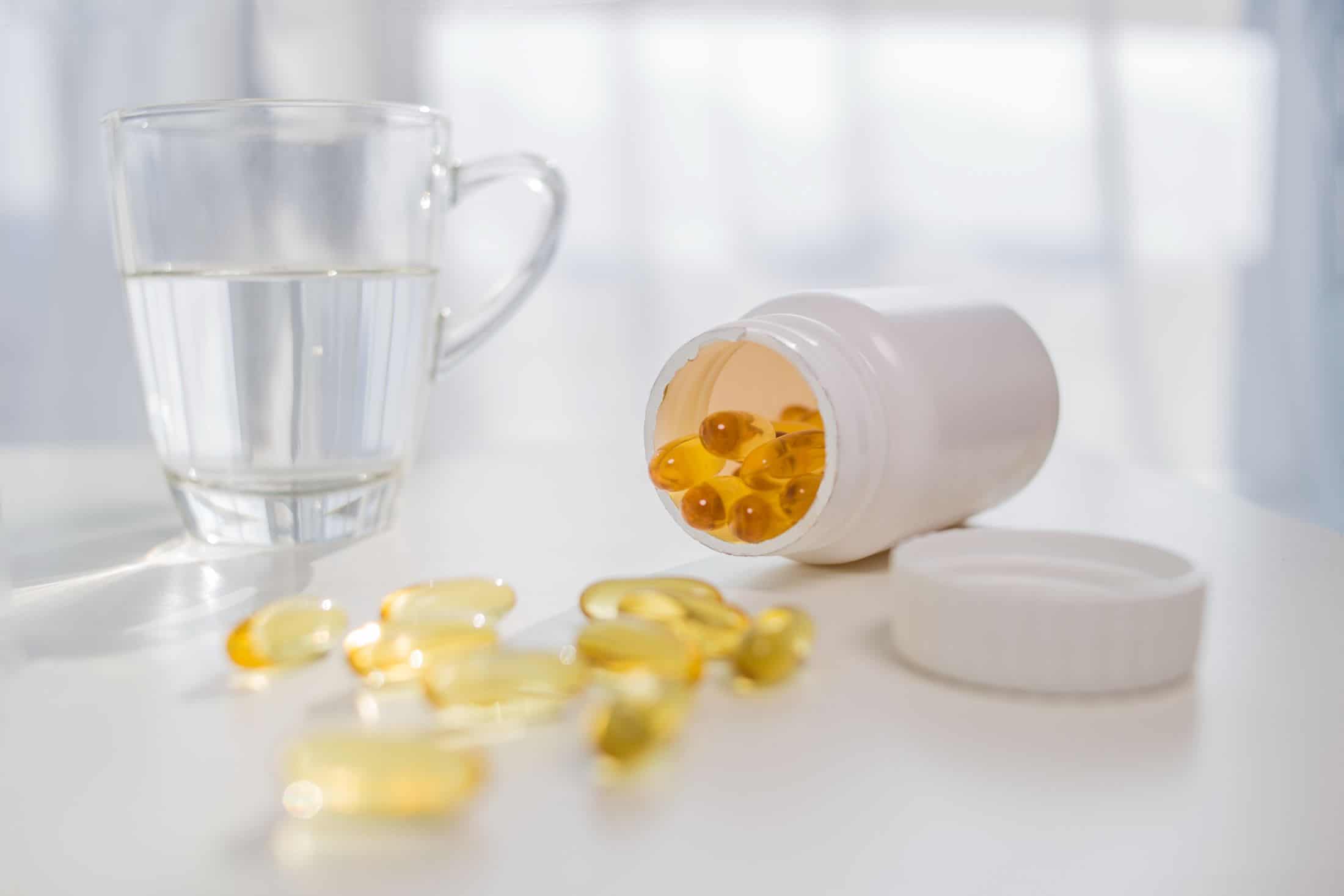If you have histamine intolerance, you might struggle with knowing what foods you can eat and what supplements you can take.
How about fish oil and histamine intolerance?
Histamine intolerance is a relatively unknown and underdiagnosed condition. Many people diagnosed with this condition, sometimes called histamine sensitivity, simply learn to avoid the foods that cause their symptoms.
But for some individuals with histamine intolerance, the problem runs deeper.
Some histamine intolerance sufferers are completely unaware that they have histamine intolerance, as symptoms can be mild or absent.
However, these individuals often wonder why they experience bloating after meals, feel tired or anxious, or have asthma-like symptoms after eating certain foods and search for answers.
Only after they adopted a low-histamine diet, did they realize that their symptoms stemmed from the inability to efficiently break down histamine.
Even some supplements can be problematic when they’re derived from food or contain certain ingredients that raise histamine.
Does this apply to fish oil too?
You may have heard about the potential health benefits that fish oil offers.
Fish oil is an excellent source of long-chain omega-3s, a type of fatty acid linked with heart health.
Fish Oil Has Anti-Inflammatory Benefits
Studies show that omega-3s help reduce the body’s inflammatory response. Some, but not all, studies show, these healthy fats could lower the risk of cardiovascular disease. They may do this in several ways by:
- Lowering blood pressure
- Decreasing inflammation
- Reducing the tendency of blood to form harmful clots
- Reducing blood triglycerides
Who wouldn’t want those potential health benefits? However, more recent research suggests of the two long-chain fatty acids in fish oil, EPA and DHA, EPA is more important for reducing inflammation and DHA may offer no added anti-inflammatory benefits. (1)
So, taking an isolated EPA supplement may be better if these studies hold up to further scrutiny.
You might wonder if you have histamine intolerance, whether taking a fish oil supplement will help or worsen histamine intolerance.
It’s clear that foods that contain histamine or reduce histamine breakdown (by blocking the DAO enzyme) can worsen the symptoms of histamine intolerance.
But what about fish oil? Lots of people are taking it these days in hopes of lowering their risk of cardiovascular disease, but can it make histamine intolerance worse?
First, let’s look at whether fish, as a whole food, can worsen the symptoms of histamine intolerance. Then, we’ll look at whether fish oil contains histamine and whether it’s safe to take a fish oil supplement if you have histamine intolerance.
Is It Safe to Eat Fish with Histamine Intolerance?
Whether it’s safe to eat fresh fish with histamine intolerance depend on how fresh the fish is. Fresh seafood is safe to eat since freshly caught fish contain no histamine.
However, when fishermen expose fish to warmer temperatures rather than freezing them right away, it boosts the histamine content of fresh fish, to the point that it can trigger histamine intolerance symptoms.
Some types of seafood, especially shellfish, spoil quickly and as they spoil, histamine levels rise.(2) Find out about the histamine content of cod.
When you eat fish that have higher levels of histamine, it increases your body’s histamine burden and can worsen histamine sensitivity symptoms.
Plus, fish is rich in the amino acid histidine. (3) Why does this matter? Bacteria in the fish’s gut can make histamine from histidine.
So, the guts of some fish that are improperly stored can become a histamine factory because of an abundance of histidine.
Only Fresh Fish is Safe if You Have Histamine Intolerance
Therefore, “ripe” fish may contain substantial quantities of histamine. Fish at the highest risk for forming histamine is fish that live in warmer waters, like tuna and mackerel.
Also, marinated fish, salted fish, and shellfish may contain higher levels of histamine. (2)
One way to avoid this chain of events is to place the fish on ice as soon as they’re caught or at least verify that the fish you’re eating is fresh. That can be a challenge!
Unless you catch fish yourself, you can’t be sure whether the fish was placed on ice right away. If not, it may be high in histamine.
That’s why it’s important to consume only the freshest of fish if you have histamine intolerance. However, frozen fish is low in histamine, so it’s an option if you enjoy fish but worry about histamine overload. Also, find out whether seaweed is high histamine.

Are Fish Oil Supplements High in Histamine?
Though fish oil comes from fish, the way manufacturers process fish oil makes it low in histamine. In fact, fish oil capsules have anti-inflammatory activity and that helps calm an overactive immune system.
However, people differ in their responses to fish oil supplements. If you take them, talk to your physician first.
Fish oil can interfere with some medications and other supplements, especially blood thinners. (5) Start with a low dose and monitor your symptoms and make sure fish oil isn’t worsening them.
Many people with histamine sensitivity do fine with fish oil supplements and even experience an improvement in their symptoms but we’re all a little different.
But know that fish oil isn’t something you must avoid if you have histamine intolerance.
Fish Oil and Histamine Intolerance: Finding a Balance for Wellness
Fish that isn’t fresh can contain substantial quantities of histamine and are something you should avoid if you have histamine intolerance. Stay away from salted or marinated fish.
Also, be aware that shellfish may also contain high levels of histamine.
Yet fish oil supplements may be helpful due to their anti-inflammatory properties (4), and they usually don’t contain enough histamine to worsen histamine intolerance symptoms.
If you take a fish oil supplement, talk to your doctor first and buy from a reputable supplier.
The best fish oil supplements undergo a process called molecular distillation to remove toxins such as heavy metals and dioxins. Make sure the fish oil supplement you buy undergoes this process.
Also, choose a brand where the company does third-party testing to ensure the purity of its product. Safety matters with every supplement! Also, explore other ways to lower histamine naturally.
FAQ about Fish Oil and Histamine Intolerance
Can I take fish oil if I have histamine intolerance?
Fish oil can be safe and beneficial if you have histamine intolerance due to its anti-inflammatory effects. But consult your healthcare provider before adding fish oil to your regimen, as it can interact with medications, including blood thinners.
Does fish oil worsen histamine intolerance symptoms?
Fish oil is unlikely to worsen histamine intolerance symptoms and may be of benefit, but we’re all a little different. Monitor your symptoms closely if you take a fish oil supplement.
Are there any interactions between fish oil and histamine-blocking medications?
Fish oil supplements may interact with certain medications, including those that affect blood clotting or bleeding. Talk to your healthcare provider about all supplements and medications you’re taking to ensure safety.
How do I choose a quality fish oil supplement for histamine intolerance?
Opt for fish oil supplements that have undergone molecular distillation to reduce contaminants like heavy metals and dioxins. Choose brands that conduct third-party testing for purity and quality assurance.
Can I consume fresh fish if I have histamine intolerance?
Fresh fish is generally safe if you have histamine intolerance, but improper handling or storage can lead to higher histamine levels. It’s best to consume freshly caught or properly frozen fish to minimize histamine-related symptoms.
What types of fish should I avoid with histamine intolerance?
Avoid fish prone to histamine production, such as tuna, mackerel, marlin, bonito, skip jack, and certain types of shellfish. Also avoid mahi-mahi (dolphinfish), sardines, amberjack, yellowtail, herring, and bluefish.
Should I be concerned about histidine content in fish and histamine intolerance?
Fish containing higher levels of histidine can potentially contribute to histamine production. While histidine levels alone may not be a sole factor, it’s recommended to prioritize fresh and properly stored fish.
How do I know if fish oil supplements are safe for me?
Before taking fish oil supplements, consult your healthcare provider, especially if you have histamine intolerance or are taking other medications. They can assess potential interactions and provide personalized recommendations.
Remember, these FAQs are for general, informational purposes. Alwaysseek personalized guidance from a qualified healthcare professional.
References:
(1) “New study finds fish oil omega-3s EPA and DHA work ….” 07 Dec. 2020, https://now.tufts.edu/news-releases/new-study-finds-fish-oil-omega-3s-epa-and-dha-work-differently-chronic-inflammation.
(2) “Histamine intolerance: What you need to know about fish.” 11 Feb. 2016, https://food.r-biopharm.com/news/histamine-intolerance-fish/.
(3) Aaaai.org. “Histamine Toxicity” https://www.aaaai.org/Conditions-Treatments/related-conditions/histamine-toxicity
(4) Arm JP, Horton CE, Mencia-Huerta JM, House F, Eiser NM, Clark TJ, Spur BW, Lee TH. Effect of dietary supplementation with fish oil lipids on mild asthma. Thorax. 1988 Feb;43(2):84-92. doi: 10.1136/thx.43.2.84. PMID: 3353893; PMCID: PMC1020747.
(5) “Is It Safe to Mix Fish Oil and Blood Thinners? – Dr ….” 06 Sept. 2016, https://heartmdinstitute.com/heart-health/is-it-safe-to-mix-fish-oil-and-blood-thinners/.

